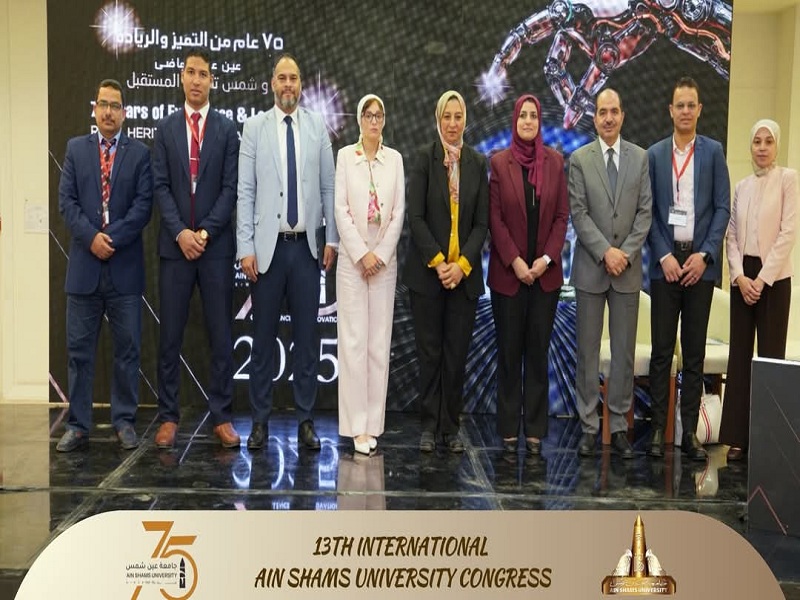Ain Shams University Showcases Its Achievements in Innovation and Digital Transformation During Its 13th Scientific Conference.
As part of the activities of Ain Shams University’s 13th International Scientific Conference, held under the theme “75 Years of Excellence and Leadership… An Eye on the Past and a Sun Lighting the Future”, the second day of the conference featured a session focused on Innovation and Digital Transformation.
The session was chaired by Prof. Ghada Farouk, Vice President of the University for Community Service and Environmental Development, and witnessed active participation from experts in the fields of innovation and digital transformation.
Prof. Ghada emphasized that innovation is no longer optional but a vital necessity for Egyptian universities amid growing competitiveness. She reaffirmed the university’s firm commitment to supporting and empowering students to become active innovators. This, she noted, can only be achieved by enhancing digital transformation efforts and equipping students with the comprehensive skills and tools necessary to transform ideas into tangible realities that serve both society and the national economy.
Algorithm Development
During her contribution, Prof. Nagwa Badr, Dean of the Faculty of Computer and Information Sciences, highlighted the faculty’s focus on algorithm development and exploring the potential of artificial intelligence applications across various fields. She stressed that real progress in AI is not possible without a strong digital infrastructure and comprehensive transformation.
She added that such infrastructure is essential for data analysis and informed decision-making, enabling the university to achieve an advanced position. Prof. Badr also underscored the importance of staying up to date with modern technology in innovation, while providing the university with qualified personnel who can represent it effectively in various sectors.
Applied Biotechnology
Prof. Mohamed Ragaa El-Satouhy, Dean of the Faculty of Science, showcased the college’s efforts to support student and research-based innovation and entrepreneurship. He presented a number of distinguished projects that reflect the ambition and competence of the university’s researchers and students.
He shed light on the pioneering Applied Biotechnology program, which spans critical domains, including:
“MATTECH Bioindustries”, a startup offering innovative industrial solutions and custom designs.
“Green Home”, a project focused on repurposing orange peels through sustainable methods.
“Herbanol”, a venture aiming to convert invasive weeds into valuable products like bioethanol and organic fertilizer.
These projects have progressed beyond creative concepts to advanced stages of research, development, and even startup establishment. Prof. El-Satouhy also highlighted Science Innovates, an annual platform supporting these ideas and offering a stimulating environment for innovation. The continuity of this initiative through 2023, 2024, and into 2025 stands as proof of the college’s strong commitment to scientific and technological innovation.
He noted the valuable support received from the Ministry of Scientific Research and Technology, the Academy of Scientific Research and Technology, and entities like EGPO-SES, which motivate researchers and students to bring their ideas to life in service of the community and national economy.
Innovation and Training
Prof. Neveen Assem, CEO of the Innovation and Training Sector, stated that the university’s strategy places great emphasis on fostering innovation. The sector houses several units and initiatives aimed at promoting a culture of innovation and entrepreneurship among students and faculty.
She highlighted the central role of the Innovation and Entrepreneurship Center and the Career Center in preparing students for the labor market through specialized programs. Prof. Assem presented notable achievements realized in a short time, along with inspiring success stories that demonstrate the university’s effective link with industry.
She added that the Innovation Center serves as a launchpad for students, offering a wide range of training programs designed to foster creativity through innovation clubs across faculties. She also introduced the project “Ain Shams Innovates”, which supports entrepreneurs and innovators both inside and outside the university.
In conclusion, Prof. Assem expressed pride in the sector’s recent acquisition of three research and capacity-building projects, including an EU-funded initiative focused on optimizing renewable energy use in the shipbuilding industry. These accomplishments reflect the university’s commitment to sustainable development and its active role in strengthening the knowledge economy to address economic challenges.
Supporting National Industry
Dr. Mohamed Magdy discussed the strategic role of the Innovation and Entrepreneurship Center at Ain Shams University in supporting national industry and empowering innovators. He explained the center’s mission to localize industry by transferring and adapting global technologies, establishing local production lines, and equipping students and researchers for industrial innovation.
The center functions as an R&D hub for factories and companies, offering technical solutions, updating products, and building strategic partnerships with the industrial sector. It also promotes collaboration by attracting joint investments and projects, establishing effective communication networks.
Moreover, the center provides technical training in areas such as mobile applications, electronics, 3D printing, CNC and laser machining, and reverse engineering, enabling participants to create practical innovations and transform ideas into actual products.
Industrial Collaboration
Eng. Mohamed Ali, R&D Manager at Elsewedy Cables, gave a presentation titled “Industrial Collaboration: Case Studies and Success Stories”, emphasizing the importance of university-industry partnerships in transforming research into practical applications.
He explained how Elsewedy collaborates with Ain Shams University’s iHub to address real industrial challenges by providing tools, equipment, and funding to students and faculty. This collaboration aims to develop devices or software systems to solve specific problems—benefiting both parties and maximizing the potential of students and their innovations through real graduation projects.
This vision aligns with national efforts to localize industry and reduce import reliance. He noted that Elsewedy, under the leadership of Eng. Amr El-Sawwaf, and in cooperation with Dr. Mohamed Magdy and his team at the iHub, has already begun developing AI-powered software models to enhance cable manufacturing processes.
Innovation Clubs at the University
Dr. Islam Adly, certified entrepreneurship trainer (IBCT) and supervisor of ASU-iClub, presented “Community Engagement Through Innovation Clubs at Ain Shams University: Goals, Benefits, and Case Studies.”
He detailed the strategic objectives of the clubs, which aim to integrate students into creative environments where they can develop real-world projects that positively impact society. The clubs emphasize teamwork, leadership, communication, and interdisciplinary collaboration.
Dr. Adly shared successful student-led projects that demonstrate the potential of young minds to shape a brighter future, in line with the university’s vision of becoming a fourth-generation institution committed to sustainable development.
The Faculty of Science team presented a new biosensor project based on terbium lanthanide composites for early prostate cancer diagnosis—an innovative, accurate, and affordable alternative to existing methods.
Another student-founded startup, Alginaid, produces high-quality alginate for use in pharmaceuticals, food, biotechnology, and dentistry. Alginaid aims to reduce import dependence and fill market gaps by offering a local, sustainable solution.
Youth Presentations
The session also featured presentations from young researchers in robotics and science innovations, highlighting the university’s strong support for youth-led innovation and entrepreneurship. The audience responded enthusiastically, praising the university’s efforts in digital transformation and its role in promoting sustainable development and community service.
University Achievements
In her closing remarks, Prof. Ghada Farouk commended the university’s bright achievements in innovation and digital transformation, thanking all speakers and participants. She described their insights as rays of light opening new horizons and affirming the university’s pioneering path.
She emphasized that Ain Shams University, with its 75-year legacy of excellence, looks forward to the future with confidence—investing in the minds of its students and empowering their creativity through a comprehensive digital transformation strategy.
Prof. Farouk also praised the efforts of various faculties—from the Faculty of Computer and Information Sciences in algorithm development and AI applications, to the Faculty of Science’s strong support for student and research entrepreneurship, and finally to the pivotal role of the Innovation and Entrepreneurship Center in connecting the university to national industry and empowering innovators—stressing that these are clear indicators of the university’s commitment to leadership and excellence.
The session was chaired by Prof. Ghada Farouk, Vice President of the University for Community Service and Environmental Development, and witnessed active participation from experts in the fields of innovation and digital transformation.
Prof. Ghada emphasized that innovation is no longer optional but a vital necessity for Egyptian universities amid growing competitiveness. She reaffirmed the university’s firm commitment to supporting and empowering students to become active innovators. This, she noted, can only be achieved by enhancing digital transformation efforts and equipping students with the comprehensive skills and tools necessary to transform ideas into tangible realities that serve both society and the national economy.
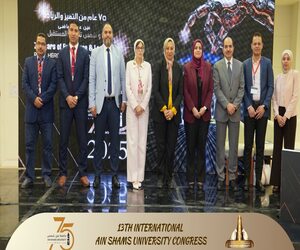 |
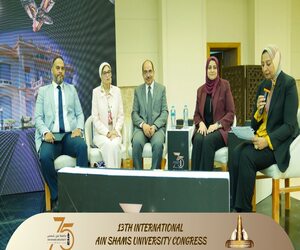 |
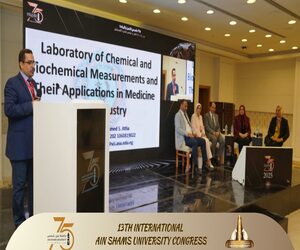 |
||
During her contribution, Prof. Nagwa Badr, Dean of the Faculty of Computer and Information Sciences, highlighted the faculty’s focus on algorithm development and exploring the potential of artificial intelligence applications across various fields. She stressed that real progress in AI is not possible without a strong digital infrastructure and comprehensive transformation.
She added that such infrastructure is essential for data analysis and informed decision-making, enabling the university to achieve an advanced position. Prof. Badr also underscored the importance of staying up to date with modern technology in innovation, while providing the university with qualified personnel who can represent it effectively in various sectors.
Applied Biotechnology
Prof. Mohamed Ragaa El-Satouhy, Dean of the Faculty of Science, showcased the college’s efforts to support student and research-based innovation and entrepreneurship. He presented a number of distinguished projects that reflect the ambition and competence of the university’s researchers and students.
He shed light on the pioneering Applied Biotechnology program, which spans critical domains, including:
“MATTECH Bioindustries”, a startup offering innovative industrial solutions and custom designs.
“Green Home”, a project focused on repurposing orange peels through sustainable methods.
“Herbanol”, a venture aiming to convert invasive weeds into valuable products like bioethanol and organic fertilizer.
These projects have progressed beyond creative concepts to advanced stages of research, development, and even startup establishment. Prof. El-Satouhy also highlighted Science Innovates, an annual platform supporting these ideas and offering a stimulating environment for innovation. The continuity of this initiative through 2023, 2024, and into 2025 stands as proof of the college’s strong commitment to scientific and technological innovation.
He noted the valuable support received from the Ministry of Scientific Research and Technology, the Academy of Scientific Research and Technology, and entities like EGPO-SES, which motivate researchers and students to bring their ideas to life in service of the community and national economy.
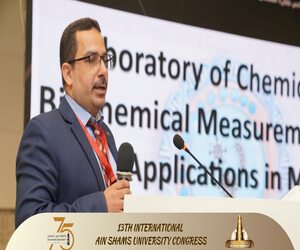 |
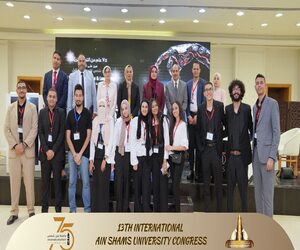 |
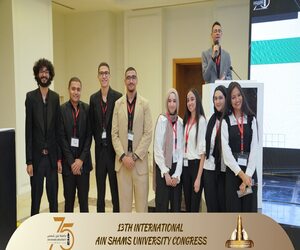 |
||
Prof. Neveen Assem, CEO of the Innovation and Training Sector, stated that the university’s strategy places great emphasis on fostering innovation. The sector houses several units and initiatives aimed at promoting a culture of innovation and entrepreneurship among students and faculty.
She highlighted the central role of the Innovation and Entrepreneurship Center and the Career Center in preparing students for the labor market through specialized programs. Prof. Assem presented notable achievements realized in a short time, along with inspiring success stories that demonstrate the university’s effective link with industry.
She added that the Innovation Center serves as a launchpad for students, offering a wide range of training programs designed to foster creativity through innovation clubs across faculties. She also introduced the project “Ain Shams Innovates”, which supports entrepreneurs and innovators both inside and outside the university.
In conclusion, Prof. Assem expressed pride in the sector’s recent acquisition of three research and capacity-building projects, including an EU-funded initiative focused on optimizing renewable energy use in the shipbuilding industry. These accomplishments reflect the university’s commitment to sustainable development and its active role in strengthening the knowledge economy to address economic challenges.
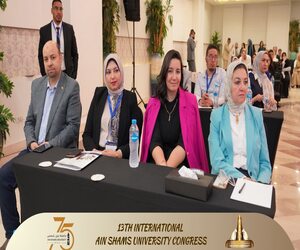 |
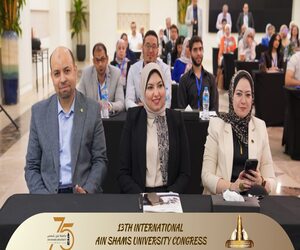 |
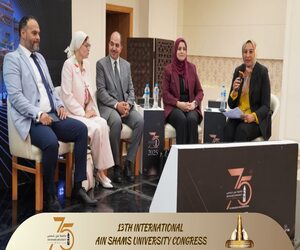 |
||
Dr. Mohamed Magdy discussed the strategic role of the Innovation and Entrepreneurship Center at Ain Shams University in supporting national industry and empowering innovators. He explained the center’s mission to localize industry by transferring and adapting global technologies, establishing local production lines, and equipping students and researchers for industrial innovation.
The center functions as an R&D hub for factories and companies, offering technical solutions, updating products, and building strategic partnerships with the industrial sector. It also promotes collaboration by attracting joint investments and projects, establishing effective communication networks.
Moreover, the center provides technical training in areas such as mobile applications, electronics, 3D printing, CNC and laser machining, and reverse engineering, enabling participants to create practical innovations and transform ideas into actual products.
Industrial Collaboration
Eng. Mohamed Ali, R&D Manager at Elsewedy Cables, gave a presentation titled “Industrial Collaboration: Case Studies and Success Stories”, emphasizing the importance of university-industry partnerships in transforming research into practical applications.
He explained how Elsewedy collaborates with Ain Shams University’s iHub to address real industrial challenges by providing tools, equipment, and funding to students and faculty. This collaboration aims to develop devices or software systems to solve specific problems—benefiting both parties and maximizing the potential of students and their innovations through real graduation projects.
This vision aligns with national efforts to localize industry and reduce import reliance. He noted that Elsewedy, under the leadership of Eng. Amr El-Sawwaf, and in cooperation with Dr. Mohamed Magdy and his team at the iHub, has already begun developing AI-powered software models to enhance cable manufacturing processes.
Innovation Clubs at the University
Dr. Islam Adly, certified entrepreneurship trainer (IBCT) and supervisor of ASU-iClub, presented “Community Engagement Through Innovation Clubs at Ain Shams University: Goals, Benefits, and Case Studies.”
He detailed the strategic objectives of the clubs, which aim to integrate students into creative environments where they can develop real-world projects that positively impact society. The clubs emphasize teamwork, leadership, communication, and interdisciplinary collaboration.
Dr. Adly shared successful student-led projects that demonstrate the potential of young minds to shape a brighter future, in line with the university’s vision of becoming a fourth-generation institution committed to sustainable development.
The Faculty of Science team presented a new biosensor project based on terbium lanthanide composites for early prostate cancer diagnosis—an innovative, accurate, and affordable alternative to existing methods.
Another student-founded startup, Alginaid, produces high-quality alginate for use in pharmaceuticals, food, biotechnology, and dentistry. Alginaid aims to reduce import dependence and fill market gaps by offering a local, sustainable solution.
Youth Presentations
The session also featured presentations from young researchers in robotics and science innovations, highlighting the university’s strong support for youth-led innovation and entrepreneurship. The audience responded enthusiastically, praising the university’s efforts in digital transformation and its role in promoting sustainable development and community service.
University Achievements
In her closing remarks, Prof. Ghada Farouk commended the university’s bright achievements in innovation and digital transformation, thanking all speakers and participants. She described their insights as rays of light opening new horizons and affirming the university’s pioneering path.
She emphasized that Ain Shams University, with its 75-year legacy of excellence, looks forward to the future with confidence—investing in the minds of its students and empowering their creativity through a comprehensive digital transformation strategy.
Prof. Farouk also praised the efforts of various faculties—from the Faculty of Computer and Information Sciences in algorithm development and AI applications, to the Faculty of Science’s strong support for student and research entrepreneurship, and finally to the pivotal role of the Innovation and Entrepreneurship Center in connecting the university to national industry and empowering innovators—stressing that these are clear indicators of the university’s commitment to leadership and excellence.


.svg)

